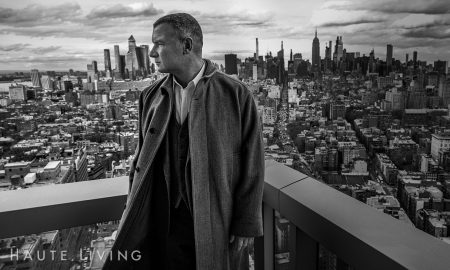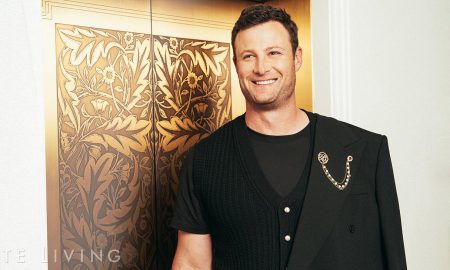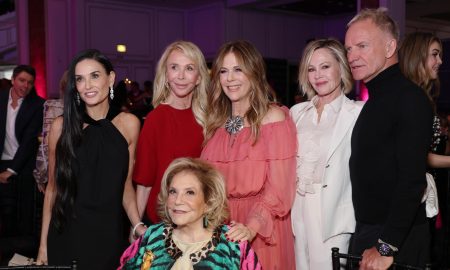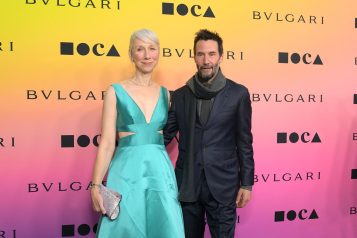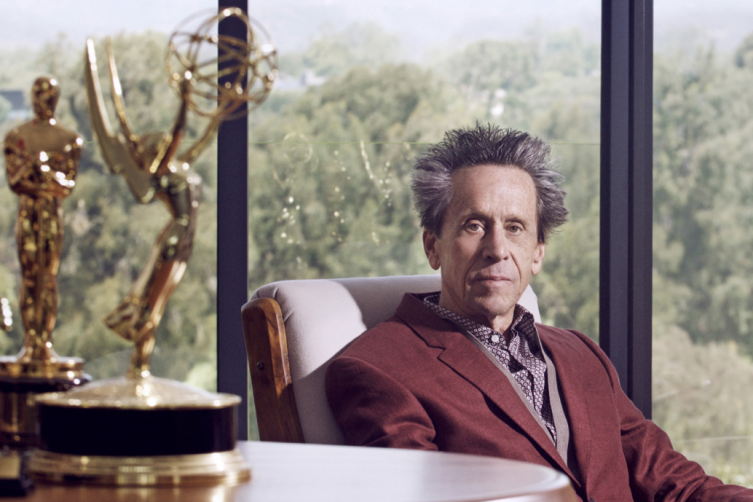
The first thing you noticed about Brian Grazer is his hair. His mane sticks straight up in spikes that look like they might hurt to touch; pointy, chiseled little spears carefully procured with a tube of Teflon-like gel. It’s a conversation starter, an instigator, a “lightning rod.” It can make people uncomfortable or, on the flip side, it can inspire Fidel Castro to sit up, take notice and ask for styling tips. True story.
The rest of the story—as recollected by Grazer in his 2015 New York Times bestseller “A Curious Mind: The Secret to a Bigger Life”—goes like this: He and his power posse (of which includes former MTV CEO Tom Freston and CBS President Leslie Moonves) lunched with Castro for three-and-a-half hours during a 2001 guys’ trip to Cuba. When the Cuban revolutionary and politician finally came up for a breath (and his translator was allowed to take one) he simply stared at Grazer and asked one, very direct, easily translatable question: “How did you get your hair to stand up that way?”
Naturally, everybody laughed, causing the Imagine Entertainment chairman and co-founder to deadpan, “Even Castro loved the hair.” Whether you love it or hate is inconsequential. Grazer’s wild mane is so distinctive, it inevitably elicits a visceral reaction from one and all. The ‘do, was accidentally created while swimming with his then-5-year-old daughter, Sage, in 1993. Her reaction: That looks cool! It has since become his own personal brand of carefully cultivated truth serum.
“My hairdo was an accident that turned into a deliberate effort to very quickly understand and weed out how I’m being perceived by people,” he notes now. “If I had a different hairdo, and if somebody didn’t like me, they might not say anything…but I think my hair is like a lightning rod. It causes people to pretty quickly reveal how they’re feeling about me.”
Truth be told though, Grazer doesn’t have much to worry about in that department. He has charmed everyone from Oprah Winfrey (who deigned to dine with him in her pajamas for their first meeting) to Carlos Slim to even the notoriously prickly rap- per Eminem (OK, so maybe there wasn’t a love fest between the two, but at least Grazer didn’t get his butt kicked when he asked Em to ‘animate’). He’s quirky, funny and likeable; a man well known for slyly leaving framed photos of himself at the homes of his friends and colleagues among their beloved family photographs.
But there’s more to Grazer than the light-hearted façade he possesses in his signature camos and T-shirts—a look he cultivated after seeing Butch Cassidy and the Sundance Kid director, George Roy Hill, march in to the late studio chief Lew Wasserman’s Universal office to do battle. “I ripped it from him—it was so hip,” he shares. “The exterior band of people within a population would think, There’s that guy with the hair, or I read your book, or I liked that movie. I don’t know if they’d think I was so deeply sensitive, or that I’m serious and have a lot of depth. My exterior is light, and potentially very jokey,” he admits.
Whatever anyone else wants to call him, there is one defining trait that Grazer abides by, and that is his burgeoning curiosity. It literally rules his life. His inquisitiveness has served him in learning new hobbies—he discovered a love of surfing after producing the 2002 surf flick Blue Crush—and in how to make a film. After meeting with Nobel Prize winner John Nash and his wife, Alicia, for example, he decided to make a movie that was so much more than a traditional tearjerker biopic about a schizophrenic mathematician; he wanted to do a movie that celebrated both Nash’s mind and his romance. The film, A Beautiful Mind, picked up four Academy Awards—for supporting actress Jennifer Connelly, for screenwriter Akiva Goldsman, for director Ron Howard and for its producer, one Mr. Brian Grazer.
As Dorothy Parker once said, “The cure for boredom is curiosity. There is no cure for curiosity.” Grazer, for one, knows exactly what she meant. In fact, the 64-year- old is so curious that, for more than 35 years, he’s been holding what he refers to as “curiosity conversations” with hundreds upon hundreds of the most beautiful minds in the world. Since the late 1970s, Grazer has been on the hunt for interest- ing and accomplished individuals. His recruitment roster includes: late Wu-Tang Clan member Ol’ Dirty Bastard, former U.S. Secretary of State Colin Powell, motivational speaker Tony Robbins, pint-sized fashion moguls the Olsen twins and the legendary Princess Diana (with whom he once shared a bowl of ice cream)— because he wants to know what makes others tick. He’s had meetings, greetings and open-ended conversations about life, love and work with just about everyone you could possibly imagine, aside from Vladimir Putin, the only person yet to be checked off on Grazer’s Curious Conversation Bucket List.
Grazer has heard that the Russian president is smart and funny, but he’s doubtful—which means, in retrospect, that he’s going to absolutely love him. That’s how it works, you see: every time he expects someone to be one way, he or she turns out to be the complete opposite. “Almost every preconception I’ve ever had has been incorrect: I’ve learned that,” he admits affably. “Even my preconceptions about subjects have been wrong. Let’s say we’re talking about architecture. I wasn’t interested in meeting any architects, because my preconception was that architecture is about space; that it had everything but a human dimension about it. The minute I met Rem Koolhaas, he said, ‘I want to explain to you that the most important thing about architecture to me is that it’s like a human organism.’ He was able to break it down in those terms in a human molecular fashion.”
t’s kind of nice, actually, because isn’t there comfort in consistency (even if consistency, in his case, means being routinely wrong)? “Every time I’ve had a preconception that someone’s going to be mean, they’re nice; someone that has an angry face turns out to be a kind person; someone that seems to know about only one subject, like many of the Nobel laureates—such as Sheldon Glasgow—knows about many subjects. He was so interesting, far beyond his ability to win a Nobel prize for reducing the four forces of nature to three,” Grazer notes, adding, “I’ve been surprised every time. Within my nervous system, every time I’ve been nervous to go to a party or meet a new person or go to a social thing, public speech, it’s been wrong every time.”
Not that this has held him back in any way. Grazer doesn’t mind making mistakes, especially when he learns from them. “I know people think that I have A.D.D. or I’m impetuous, but I’m the exact opposite. I never make lightning-fast decisions on important things like a movie. I’d always think about it, process it for days, turn it over, collaborate and try it on other people. I’d feel something, but I’d test it… I trust my gut on the information.”

THE PATH
Though he admits to having hiccups (infrequent as they are), it’s quite apparent Grazer has no problem smoothly riding his wave of endless opportunity. He paints a picture where he had just graduated from the University of Southern California with a degree in psychology, and was in his first year at USC Law School. He’d over- heard a conversation outside his bedroom window where one guy had just quit his cushy job working as a legal clerk for a man named Peter Knecht at Warner Bros. (You see where this story is going, don’t you?)
Grazer wasted no time locking down that job. He kept his position as a “glorified courier” interesting by personally delivering papers to the famous folk they were meant for, instead of the usual secretaries and assistants he would have typically encountered. He didn’t have to personally deliver papers to Sue Mengers, a talent agent who then-represented Cher, Burt Reynolds and Ali MacGraw, or to Warren Beatty at the Beverly Wilshire, but he did. He never asked for jobs: he merely asked questions, and at the same time, created opportunities for himself in the process. His curiosity was his secret weapon.
Grazer’s tenure at Warner Bros. was short-lived: he was fired after a year. “I was always getting fired early-on in jobs. I could get any job, but then get fired almost immediately,” he says without preamble, adding, “I was always OK with being dis- missed if I had failed at being interesting.” That just meant better breaks, like working for TV producer Edgar J. Scherick, until he eventually landed his first producing gig at Paramount Studios.
This, of course, was the real turning point in his life, because at Paramount, Brian Grazer would meet the man who would become the most important person in his life outside of his family: his production partner, Ron Howard.
“He’s one of the kindest human beings I’ve ever met. He’s fair, he’s honorable and he’s become a master filmmaker,” Grazer enthuses. “When we met, there was no evidence he could ever be a master filmmaker and win two Oscars, but he has. I love the partnership, and I love hanging out with him.”
The feeling is likely mutual. The two founded Imagine Entertainment together in 1986, a production company which, to-date, has been nominated for a total of 43 Academy Awards and 158 Emmys. Their professional success aside, Grazer can’t say enough about the wonderfulness that is Howard.
Given Grazer’s affinity for the word “curiosity,” we’re surprised he didn’t give his company said moniker, but, instead, he just shrugs. “We didn’t think about it,” he says, adding that though “The Curious Company” was never even an idea, he and Ron did very nearly called Imagine “What If.”
“I thought of What If, because of all the projects I worked on—in particular early projects like Night Shift and Splash—I thought, What if I was in this situation? Everything juxtaposed me to some situation. It was like, What if I wanted to find the perfect girl? What would she be like?’ It still is what if. What if I were one of those astronauts in Apollo 13, what would that feel like? I was always asking astronauts ‘Do you sweat, do you feel nervousness?’ I just kept drilling them on what everything feels like, because that’s what I mostly care about. In the end, we couldn’t do What If, so we thought, Imagine This. It was born out of What If.”
Grazer’s what ifs, coupled with his curiosity are inextricably linked; one fosters the other. Though he is quick to note that he never meets anyone with a movie fresh in his mind, he still relishes the chance to learn from each person and each film that he produces. For example, while working on the 2007 drama American Gangster, Grazer thought, What if I could learn to dance? So, he enlisted the assistance of Fatima Robinson, one of the film’s choreographers, who was already teaching cast members like RZA, Denzel Washington and Russell Crowe some booty-shaking moves. “When she had a few hours off, I said to her, ‘I’d like you to teach me how to dance,’” he recalls. “I’ve always said that I’ve made so many movies that involve cool shit, including Boomerang, and I like music and clubs, so I wanted to know how to have the right energy and a groove that would not be corny. [Fatima] showed me how to do it. I’m not an amazing dancer, but I no longer look corny in a club.” As a side note, he also learned how to shoot machine guns from a weapons expert in Aspen, also while filming Gangster (go figure).
While Grazer continues to give the Most Interesting Man in the World a run for his money, his assigned role among friends like Carter and Freston (who he describes as ‘coolest kid in school’ and ‘the leader,’ respectively), is that of ‘the guy that’s up for anything.’ Notes Grazer, “I’m the friend that will go, ‘Let’s do it! When should we do it? We should go sooner than later. Let’s go now!’”
Why are we not surprised?
GETTING UP TO SPEED
“I’m a lot less anxious than I was 20 years ago.”
Grazer certainly doesn’t look anxious this gray summer morning. In fact, he is the living embodiment of relaxed, leaning back in his patio chair, one leg crossed elegantly over the other, sipping slowly from his coffee cup.
Here at his grandiose Mark Rios-designed home overlooking the Riviera Country Club in Santa Monica, everything appears to be in hyper color, including the producer himself. The pool is azure; the grass is vibrantly green; the roaring fireplace shooting red and gold sparks. There is a tree swing in the distance, and his at-home artist’s studio—formerly a guesthouse—is steps away. There is a basketball court, a yoga platform and a trophy room to house all of Grazer’s heavy metal. Pieces by Andy Warhol, Ed Ruscha, Richard Prince, Jean Prouvé and Jean Royère hang harmoniously on the walls. In the magnificent kitchen, a 1950s Boris Lacroix chandelier dangles, rescued from a casino in Cannes. It is an environment that not only fosters his creativity and curiosity, but also completely calms the super producer. If only he had lived in such an abode 20 years ago while meeting Dr. Jonas Salk.
Grazer admits that he was so on edge to meet the scientist who cured polio that he actually became physically ill. “As I approached him, I vomited. I was just so nervous,” he recalls.
“I look laid-back, I dress laid-back, I try to act laid-back [but] I’m not laid-back,” Grazer says. Although he is, by nature, an unrelaxed person, and readily admits that he still frequently gets anxious, he has learned to combat this through years of practice. “I can’t change all the years of life, but now I’ll have a nervous reaction, and immediately calm myself down. I’ll look at it like a light switch, and switch off the fear. I’ll do creative visualization if I have to.”
Grazer recently received a standing ovation at a global YouTube conference from 1,000 kids, as well as praise for speaking to a roomful of aerospace experts at Northrup Grumman. While he loved doing both, he does confess to having a certain fear about the experiences. “The anxiety about public speaking is about self-worth,” he declares. “You don’t feel like you’re worthy of speaking to many people, but over time, you’ve realized that there are people that have a lot less to say than you do.”
There are a few specific times he can recall in recent years when he truly did not want to open his mouth. His good friend Herbert A. Allen, an investment banker and creator of the Allen & Co. Sun Valley Conference, advised him to make the hardest call of his day first. Despite the wise advice, it took Grazer a fair amount of time to drop his passion project, Cartel.
Inspired by the 1993 Italian film La Scorta, the film was about a man who would do anything to save his son once his wife was murdered after getting involved in the Mexican drug cartels. Universal pulled the plug on the project just five weeks before the vehicle starring Josh Brolin was slated to begin filming in Mexico City. “I loved this movie, and I had to call the chairman of Universal to end it,” Grazer admits with a frown. He is still upset speaking about the film five years later.
“I worked on this project for three years intensively, and when I work on something intensively, I’m living it every moment in my imagination, living the fantasy of its outcome. I wanted to do this really dramatic amazing autopsy on what the cartels were like in Mexico five years ago when it was the most extreme it’s ever been. I had a tipping-point moment with Condoleezza Rice. She said, ‘Even though you’ve been assured that you’ll have complete safety from the parent company, and that security experts are telling you you’ll have complete safety, I don’t believe that,’” he recalls.
He pauses, and for a second, a sheen appears in his eye. “I get emotional,” he apologizes. Whatever Jedi mind trick Grazer has been using to calm himself works. He’s back to normal, simply telling a story about a rough patch in the past. “It was so dream shattering,” he admits. “I really wanted to do this. I knew that I would not personally want to go there myself, so how could I possibly allow anybody else to go there? It’s bad karma. It’s not like life or death: I just recall the emotionality of it all.” Calling the chairman of Universal to initiate pulling the plug on the project was one of the hardest things Grazer has yet had to do, though he notes, “The chairman of Universal was amazingly cool. When I called him to discuss my concerns, he said, ‘If you think it’s not safe, we’re going to go with your opinion.”

It’s been said that everything happens for a reason—and that applies to love as well as work. In regard to the former, Grazer was not looking for it per se, though it hit him like a ton of bricks when he met Veronica Smiley, the woman who became his fiancée.
Strangely enough, with Smiley, a freelance brand and marketing consultant who advises companies, tech start-ups and nonprofits, also the former Chief Marketing Officer of sbe, the LA-based hotel and restaurant management company, Grazer forwent piquing his signature curiosity.
“I didn’t follow the lead on curiosity,” he admits. “[Veronica’s] close friend, Barbara, said, ‘When you’re ready to meet this really, really great girl, I can introduce you to her, but you have to be really polite, really kind; you have to open doors, and when you have to go to the bathroom, you need to tap her on the shoulder.’ I wasn’t sure I could do all that!”
Five months later, they still hadn’t met, but then Grazer was blind- sided when he spotted Smiley at a restaurant where he was already dining with their mutual friend. “I was taken by her,” he confesses. “I had two glasses of wine, and I was hypnotized by her lips. I started kissing her within five minutes.”
Grazer fell deeply in love with the philanthropic Smiley who, along with Nicole Avant, Lilli Bosse and Angella Nazarian, co-founded Visionary Women, a nonprofit aimed at empowering women through community and leadership, and proposed less than a year-and-a-half later at the Huntley Hotel in Santa Monica.
Planning his impending wedding is just one of the producer’s upcoming projects. The second season of his hit series, Empire, will return to FOX on Sept. 23 and Heart of the Sea, the true story of the American whale-ship the Essex, starring Chris Hemsworth and directed by Ron Howard, will hit theaters this December. He’s also working on the third big screen adaptation of Dan Brown’s popular The Da Vinci Code series, Inferno, with Tom Hanks and American Made, a thriller starring Tom Cruise. The latter is a film about a pilot who starts working for the CIA as a drug runner in the 1980s. Grazer gets enthusiastic speaking about American Made and its subject matter, saying, “I think American Made is really hip.”
Grazer gets enthusiastic speaking about American Made and its subject matter. “I like gangster movies,” he declares. “I like movies where the subject appears to be about one thing, and it’s about another thing, entirely.”
The reason that sounds familiar is that it perfectly sums up Grazer, himself. “I think I get the joke in life,” he says. “What’s corny, when I’m being laughed at, when I’m self-aware. That’s why I’m self-effacing: I get that this whole thing is one big experiment.”
A FEW OF BRIAN GRAZER’S KEY CURIOSITY CONVERSATIONS
OPRAH WINFREY
Grazer met Oprah on Jan. 29, 2007. She came to meet him for breakfast at the Hotel Bel-Air in her pajamas. “Oprah was one of my favorite people. She’s Oprah Winfrey, one of the most powerful women in the world. She’s unaffected and unpretentious. She dials the phone herself—she makes a point to do things, to be really human—and makes you feel comfortable. She could not make you feel comfortable, because she’s laser sharp, powerful, has enormous charisma; she knows every push button that you would have to know in the human psyche, but she does [make you feel comfortable] anyway.”
BEYONCE KNOWLES
“Beyonce I met because I’d made a Clint Eastwood movie, The Changeling. I always hated the title, but loved the movie. I knew Jay-Z, and I got to talk to her for a very long time. She was just becoming imperceptibly pregnant. She wanted to talk about professional stuff. What it was like to make a movie, what Clint Eastwood was like. At that time, she was really approach- able, really easy to talk to.”
MARY-KATE AND ASHLEY OLSEN
“The Olsens were just really nice. They were blowing up as business entrepreneurs and I thought, ‘I have to meet them.’ They were so nice that I said, ‘I’m having a Sweet 16 birthday party for my daughter, Sage, at Chateau Marmont—where they were staying—would you guys come?’ They did. They were such a sighting for everybody.”
CARLOS SLIM
“Carlos Slim [the richest man in the world] didn’t talk for 10 minutes [when we first met]. He gave me a big hug and was friendly enough, but he was speaking to his son in Spanish for 15 straight minutes and I thought, He’s so not interested in this. I whispered to the guy that arranged [the meeting], ‘I think I should go because I’m not feeling good about this.’ [The friend told me], ‘No, no, no: he’s completely engaged. He’s telling his son everything about you and about Apollo 13. He was really into it.’”
EMINEM
“He’s a real original force. When I met with him [music producer Jimmy Iovine set up a meeting] he didn’t speak for 45 minutes. He came to my office, and I felt like I was part of discovering him—I did discover him for film [he starred in Grazer’s 8 Mile]—I thought he was scary. He wouldn’t look at me, nor would he speak, and I thought, ‘This is going to be a total missed opportunity’ so I said, ‘Come on, can’t you animate?’ I thought he must have thought ‘What an asshole.’ But then he talked, and what he said became the movie.”










